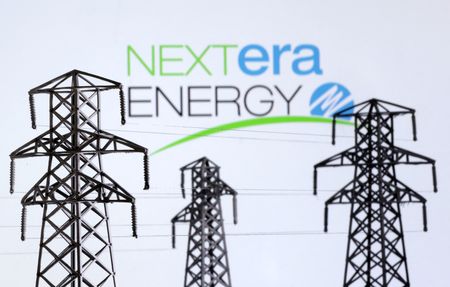(Reuters) -NextEra Energy Inc on Wednesday posted mixed quarterly results, sending its shares sliding as the renewable power company announced the retirement of the head of its key Florida utility unit.
NextEra, the largest generator of renewable energy in the United States, fell short of Wall Street’s revenue estimates, though executives said recent U.S. legislation should cause in renewables to surge in coming years.
NextEra’s shares dropped 6% on Wednesday, making the company one of the day’s biggest losers in the Standard & Poor’s 500 Index. The company is the third-largest U.S. energy company by market value, trailing only oil and gas giants Exxon Mobil and Chevron Corp.
Juno Beach, Florida-based NextEra’s fourth-quarter revenue of $6.16 billion fell short of Wall Street estimates of $6.55 billion, according to Refinitiv data. Adjusted profit of 51 cents per share, however, beat estimates of 49 cents per share.
The company said Eric Silagy, head of NextEra subsidiary Florida Power & Light (FPL), America’s largest electric utility, would retire after more than 11 years at the helm. He will be succeeded by Armando Pimentel.
A political watchdog group filed a complaint last year with the U.S. Federal Election Commission, saying FPL violated Florida election laws. NextEra CEO John Ketchum said an internal review should show FPL would not be liable for violating any laws, but added that this and other issues may have contributed to Silagy’s retirement.
“When you think about all the challenges that he had to overcome with the hurricanes and with high natural gas prices and inflation in the supply chain and the media allegations and all those things … I think it took a toll,” he told analysts on the conference call.
Previous executives had generally served for about a decade, Silagy said on the call.
Analysts at Morningstar said the decline in shares on Wednesday could be related to Silagy’s retirement and regulatory uncertainty.
The company’s clean energy unit logged its best year for new renewables and storage growth, adding more than 8,000 megawatts to its backlog. NextEra is banking on increased use of renewable energy like solar and wind for power generation amid a global push to shift to cleaner fuel sources.
That move accelerated last year following sanctions on Russia due to its invasion of Ukraine, which sent gas and oil prices soaring. The U.S. Inflation Reduction Act should increase spending on renewable projects, Ketchum said.
“We anticipate a tremendous acceleration of growth in renewables and storage deployment across the U.S. due in part to the IRA, particularly in the latter half of the decade,” he said.
The power sector last year was battered by extreme weather conditions. NextEra was hit by $53 million in storm restoration costs during the quarter.
Natural gas prices averaged $6.10 per million British thermal units (mmBtu) in the October-December quarter, about 26% higher than the previous year.
(Reporting by Arunima Kumar in Bengaluru; Editing by Vinay Dwivedi, Shailesh Kuber and Maju Samuel)

